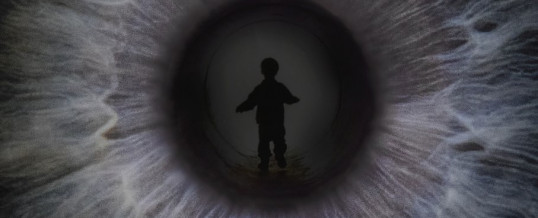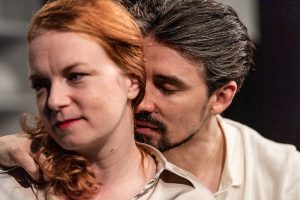
Rabbit Hole (Union Theatre, London, until May 1st)
⭐⭐⭐
An exploration of love, bereavement, grief and healing is given meaningful treatment at the Union Theatre.
The Pulitzer Prize winning Rabbit Hole by David Lindsay-Abaire may be better remembered from the film version starring Nicole Kidman, but in a stripped-down Union Theatre (fewer than 40 fold-up chairs on three sides of an acting space) we are reminded of the power of live drama.
 Front Foot Theatre have created a tense, moving, poignant and ultimately hopeful production of a play that tackles tough issues head on yet never loses sight of the lightness and humour.
Front Foot Theatre have created a tense, moving, poignant and ultimately hopeful production of a play that tackles tough issues head on yet never loses sight of the lightness and humour.
As we focus on a married couple dealing with the loss of their young son in a road accident we’re reminded that grieving takes many shapes and nobody will deal with it in exactly the same way.
Dad Howie (a brilliant emotional portrayal by Kim Hardy) wants to cling on to the memories while desperately wanting to carry on with life, reluctant to get rid of son Danny’s toys, regularly watching family videos of them both, keen to explore the possibilities of a support group and resistant to his wife’s wish to sell the house and move on. So much simmers just beneath the surface in Hardy’s sharp performance as he struggles with his conflict and the audience is so close to the action we can see the pain and sense of loss behind his eyes.
Mum Becca (Julia Papp) is more pragmatic, even to the point of deciding to meet with Jason (an earnest, sensitive and sympathetic Max Pemberton), the young man responsible for the accident and finding herself drawn to the odd subtext of parallel universes – the idea that in another world they are not paralysed by grief but might even be happy.
Becca appears to have moved on further in coming to terms with what has happened, even as she consciously or otherwise erases Danny from her life, which means the audience can’t fully engage with her journey, but Papp manages well to show how this is linked to the mourning process.
As the central couple Hardy and Papp don’t always capture the essence of a loving relationship now fractured, yet perhaps this is the very nature of the different approaches to devastating loss and the hopeful signs of rekindled love come across well.
Understandably there is not much humour in what must surely be triggering to some watching, but the script contains many instances of wit and levity to provide welcome balance. These lighter moments are largely provided by Becca’s sister Izzy (Ty Glaser) and their mum Nat (Emma Vansittart), both in splendid form.
Glaser is excellent as Izzy, well-meaning but careless, unmarried and pregnant,  a wild child not fully able to comprehend why her enthusiasm about a new baby might be upsetting for her sister. Glaser ensures that in the midst of the tension the character is never less than likeable.
a wild child not fully able to comprehend why her enthusiasm about a new baby might be upsetting for her sister. Glaser ensures that in the midst of the tension the character is never less than likeable.
Vansittart is a commanding presence as Nat, voicing some very funny one-liners, and supportive of her daughters, yet enduring a lasting grief of her own as we discover her own son committed suicide at the age of 30. While this event didn’t affect her daughters in the same way, there are moments of tenderness and growth as Becca comes to understand that bereavement affects people differently. Vansittart delivers a performance of which Christine Baranski would be proud, sophisticated and worldly wise but dripping with icy sarcasm and waspish innocence.
 Lindsay-Abaire wrote the screenplay for the 2010 film and gave an extra dimension to the story and the characters, who on stage can appear thinly-sketched. Seeing a theatrical production underlines the personal and the intimate side and director Lawrence Carmichael masterfully steers the production away from what could very easily become American soap opera. It’s a production that remains passionately real without straying into overly-sentimental. Carmichael’s approach shows intelligence and deep understanding of the subject matter and the best way to portray tough and uncomfortable themes.
Lindsay-Abaire wrote the screenplay for the 2010 film and gave an extra dimension to the story and the characters, who on stage can appear thinly-sketched. Seeing a theatrical production underlines the personal and the intimate side and director Lawrence Carmichael masterfully steers the production away from what could very easily become American soap opera. It’s a production that remains passionately real without straying into overly-sentimental. Carmichael’s approach shows intelligence and deep understanding of the subject matter and the best way to portray tough and uncomfortable themes.
In such a small acting space Ethan Cheek’s set is all the more important, cleverly grey-hued with the only bursts of colour being in the references to Danny, not least the canopy crammed with toys, bulging and threatening to burst out at the slightest nudge.
And Ryan Day’s lighting is again a triumph of atmospheric subtlety, supporting the contrasts of light and shade in the drama itself.
Front Foot Theatre are to be commended for this revival of a compelling tear-jerker which demands to be seen in such a small venue, containing performances that regularly break through the fourth wall with riveting emotion.
Image: David Monteith-Hodge – Photographise
David Guest
APR
2022
